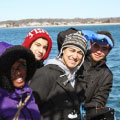A COSEE tenet is to support efforts to increase ocean awareness, literacy, fellowships, and opportunities for under-represented/under-served populations to participate more fully in the ocean sciences. Increasing the number and diversity of students who successfully pursue careers in ocean sciences is key to addressing the growing demand for professionals in our fields who genuinely understand and make a contribution to cutting edge research.
At the Network level, the National COSEE Office (NCO) maintains a strong and vital presence at several national conferences, including SACNAS (which targets under-represented/under-served students in STEM disciplines and their K-16 teachers). These conferences, most of which meet annually, afford the NCO the opportunity to increase the visibility of the Network across target audiences.
Individual Centers use a variety of innovative approaches to reach diverse audiences: workshops that address how to communicate to various audiences; collaborative fellowships for graduate students that bridge research, formal and informal education, and traditional cultural practices; webinars produced by and for under-represented scientists and students; and the development of ocean science curriculum that focuses on students in under-served communities to name a few.
COSEE Highlights
In April, 2013 teachers from the American School for the Deaf participated in a Teacher Technology Experience (TTE) focused on acoustics. The TTE was a professional development opportunity that included building a simple hydrophone; working with freely downloadable acoustic analysis software; and planning for the development of educational resources for use in the classroom.
The Be Inclusive workshops were designed to 1) identify effective methods of presenting scientific information and 2) address preconceptions towards science with an eye toward communicating information to various audiences. The majority of attendees found these workshops useful and were receptive to the idea of using an alternative presentation method (i.e. concept mapping) as a way to communicate their science in an inclusive and effective manner.
COSEE Collaborative Fellowships bridge research, formal and informal education, and traditional cultural practices. Each year, up to four fellowships are awarded to graduate students working as teams from Ocean Sciences and Hawaiian Studies departments to bridge traditional knowledge and ways of knowing with current science research.
HI Sci is a University of Hawaii at Manoa Native Hawaiian graduate student-driven initiative targeted at raising awareness and interaction between Native Hawaiians, the UHM student body, administration, affiliates, community of the Hawaiian Islands and members of the Hawai'i Science community. HI Sci aims to amplify the presence, knowledge and voices of the community at large and Native Hawaiian students within the Hawaiian Island science community.
 | |
COSEE-TEK and UConn’s Louis Stokes Alliance for Minority Participation (LSAMP) program collaborated to develop a two-day intensive overview of ocean science and technology for LSAMP undergraduate scholars. This program has evolved into the Ocean Science and Technology Challenge, a multi-faceted program that provides students with an overview of careers in ocean science and technology and opportunities to work as a team coached by a COSEE-TEK technician to design and build an ocean technology of their choice to meet the annual challenge theme.
The Many Learning Pathways in the Ocean Sciences webinar series featuress online presentations from ocean and climate scientists paired with education scientists from across the country. The series highlights scientists making significant contributions in their fields and serves as a forum for sharing successful strategies for increasing diversity in the ocean sciences community.
COSEE Ocean Learning Communities' My Place in Puget Sound curriculum brings current oceanographic research to high school student learning through a place-based inquiry science unit that addresses environmental issues with real and current research data.
COSEE Pacific Partnerships' Promoting Research Investigation in the Marine Environment (PRIME) internship program is a successful, replicable, and rewarding model for engaging community college students in research, increasing ocean literacy, and engaging scientists in broader impacts activities.
For five years, the National COSEE Office (NCO) has maintained a presence at the annual Society for the Advancement of Hispanics/Chicanos and Native Americans in Science (SACNAS) national conference to raise the profile of ocean sciences in our communities. For these conferences, the NCO co-sponsors ocean science symposia and education panel sessions, maintains exhibits, and organizes other ocean science-focused organizations to exhibit.

